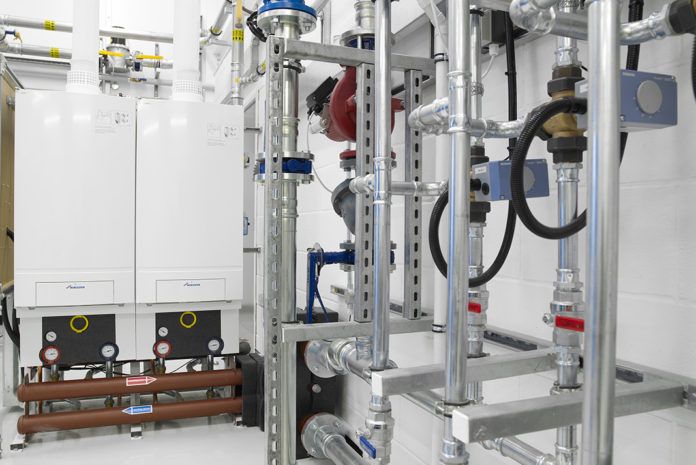
The nature of domestic and commercial boiler installations may seem to be worlds apart at times, but a significant amount of light commercial installations are simply larger households requiring boilers with higher outputs and efficiency.
Installers should be aware of the opportunities of taking on both domestic and light commercial installations.
There is a very grey area between a domestic heating system and a light commercial system. It could look like a daunting task making that jump from one to the other, but it’s a smaller step than you might think.
If you are a qualified Gas Safe Register engineer at a domestic level, then this will take you up to boiler inputs of 70KW, anything above that you need different qualifications. The truth is if the heating system doesn’t exceed the 70KW input limit you can install it without the need for any further qualifications.
Most houses in the UK, let’s say a three bed, semi-detached, have a combi boiler installed. We are lucky enough to have tens of thousands of installers who fit those every day. But if you look at slightly bigger homes, say five bedroom and more, they require higher output boilers that are close to commercial size but are actually just very large domestic boilers. Think of it as fitting 20 radiators rather than 10.
Installing these larger boilers is an area where not all installers choose to operate in – so it’s less contested. With that in mind you can argue that there are more opportunities for work, and in turn more profit, especially if you operate in an affluent area.
For example, if you’ve noticed numerous enquiries from large homeowners then assess how wide the market might be in your area. Even more so if you know there aren’t many local commercial installers around. You may find out that other small commercial premises such as guest houses, pubs or restaurants may also be struggling to find installers.
Then you will know there’s an opening. If it still feels daunting or intimidating even with the prospect of extra opportunities, then I assure you it shouldn’t be. We have case studies of installers who have fitted multiples of our GB162 boilers together, creating a massive 1.8MW heating system that powered an apartment block. That is at the extreme side, but the point is that if you scale it down to more familiar territory, you can do the same by joining two or three domestic boilers together.
This will create enough energy to heat a larger house. There is also a lot of merit in choosing two or three domestic boilers over one big one. If one is being serviced or broken down, then the house won’t go without warmth.
Now I know I’ve been talking about how easy it will be to make that step, but you may need to become more familiar with different products and designs. This is just because you would be operating in multiple zones of the heating system.
The upstairs and downstairs of the house may have different temperatures at different times for example. So there are differences unquestionably. However, there are training courses out there to help.
At Bosch there are a number of courses, including Commercial ACS and GB162 product training. Bosch’s sales force will be able to point you in the right direction, taking you to a local installation or training academy to show you how it works.
Taking a couple of days of your time isn’t too much when compared to the size of opportunity you create. As mentioned before, there is an element of self-learning. If you are doing very well as a domestic installer, but you notice there are a lot of big houses in your area with a lack of local commercial installers, I think it is more than worth taking the plunge. To enrol on a course contact technicaladvice@uk.bosch.com.
